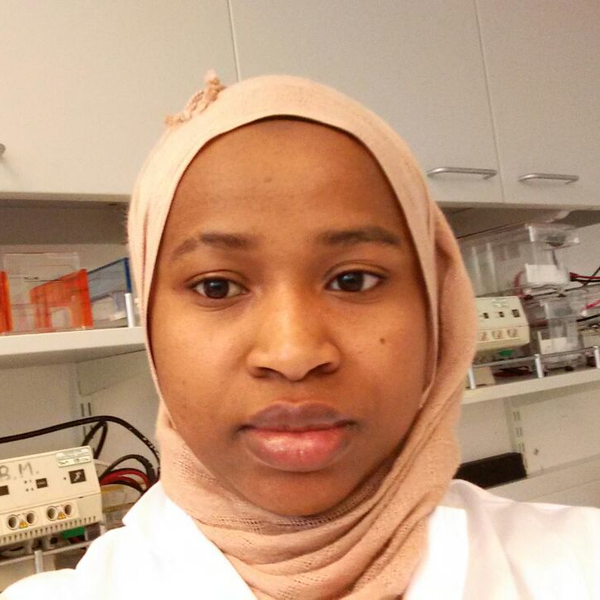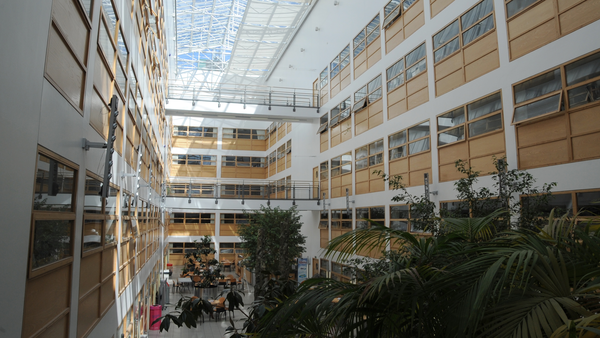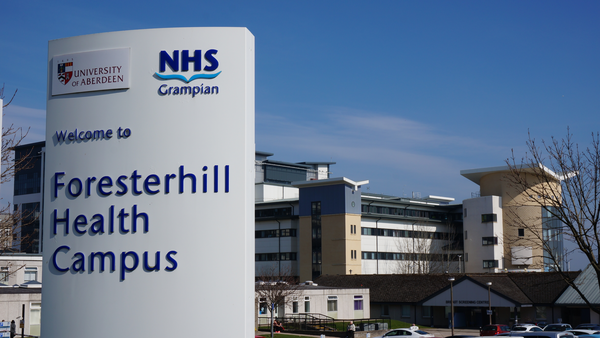Aisha Gidado

Designed to develop both your research and practical skills, our MSc in Microbiology will enhance your academic knowledge of the latest advances in microbiology and improve your employability and career prospects.
This programme is available to start in January or September. Apply now
The MSc degree in Microbiology will take you through a wide-ranging curriculum describing some of the latest advances in microbiology. It includes courses on microbiology, applied statistics, bioinformatics, regulation of microbial adaptation and host-pathogen interactions in infection and disease. The MSc Microbiology aims to provide you with:
This programme is ideal for students and scientists who would like to improve their career prospects, fill skills gaps and further their hands-on microbiology research experience.
This programme is available to start in September or January.
| Fee category | Cost |
|---|---|
| UK | |
| Tuition Fees for 2025/26 Academic Year | £12,200 |
| Tuition Fees for 2026/27 Academic Year | £12,200 |
| Tuition Fees for 2025/26 Academic Year (University of Aberdeen Graduates *) | £7,000 |
| Tuition Fees for 2026/27 Academic Year (University of Aberdeen Graduates *) | £7,000 |
| EU / International students | |
| Tuition Fees for 2025/26 Academic Year | £26,250 |
| Tuition Fees for 2026/27 Academic Year | £26,250 |
| Tuition Fees for 2025/26 Academic Year (Self-funded Students *) | £18,250 |
| Tuition Fees for 2026/27 Academic Year (Self-funded Students *) | £18,250 |
15 Credit Points
Why do some microorganisms cause disease, yet others don’t? This course explores host-pathogen interactions from bacterial, fungal, parasite, viral and host perspectives in a lecture series, examining virulence factors, host defences and immune responses.
Students develop a detailed knowledge of one specific host-pathogen interaction through self-directed study and working as a group to review a specific disease selected by the students. In addition, students will enhance their ability to work within teams and will develop their skill in academic writing, creating a group-written review article.
Course workshops discuss experimental design for analysis of host-pathogen interactions, virulence and evaluation of novel drug treatments.
The course materials will enable students to develop and refine their understanding of the roles of host and pathogen in infectious disease.
Please note that some of the material on this course may describe animal research and/or may discuss disease outbreaks.
15 Credit Points
This course in Applied Statistics intends to focus on the application of statistical techniques in postgraduate research for health professionals, with a particular emphasis on the correct interpretation of statistical analyses. The course will NOT concentrate on the statistical theory underlying the subject. An important component of the course is the use of a statistical package, IBM SPSS Statistics, which can be used to implement all the methods taught on the course.
This course, which is prescribed for all taught postgraduate students, is studied entirely online, is studied entirely online, takes approximately 2-3 hours to complete and can be taken in one sitting, or spread across the first 4 weeks of term.
Topics include University orientation overview, equality & diversity, MySkills, health, safety and cyber security, and academic integrity.
Successful completion of this course will be recorded on your Transcript as ‘Achieved’.
15 Credit Points
The aim of this course is to develop understanding of hypothesis-led research and to provide an opportunity to study advanced science concepts and critically evaluate research led by an experienced member of academic staff.
Students choose one of the following courses:
15 Credit Points
Biologic therapies represent one of the most important and novel areas of drug discovery in the 21st century. The aim of this course is to provide an insight into the success of protein, peptide or antibody based biologic therapies and to examine how this exciting new area will develop over the next decade.
15 Credit Points
A course describing the wide range of ways in which genome sequencing has transformed biomedical research and our understanding of human disease.
Contains material detailing a range of examples of advanced genomic tools and technologies and their applications in biomedical science.
A course that makes wide use of the literature, allowing you to read about and understand the latest genomics-based methods.
A course placing a high value on its teaching and learning; lecture material supported by workshops – your chance to put knowledge into practice, ask questions and enjoy the science.
Students take one of the following:
60 Credit Points
This course offers students the opportunity to complete a substantial piece of data-driven, empirical work within their field of study under the supervision of an experienced researcher.
Topics available will be varied but within the domain of their field of study. Alongside supervisors, students will identify a suitable topic area, describe an appropriate study design and implement an empirical study to be completed within a laboratory setting. Students will be involved alongside the supervisors in the process of defining the research question, and developing the research plan and, where appropriate, obtaining regulatory approvals. This course is for laboratory-based projects (if you are intending to undertake a project in non-laboratory setting you should register on PU5913)
60 Credit Points
This course offers students the opportunity to complete a substantial piece of data-driven, empirical work within their field of study under the supervision of an experienced researcher.
Topics available will be varied but within the domain of their field of study. Alongside supervisors, students will identify a suitable topic area, describe an appropriate study design and implement an empirical study. Students will be involved alongside the supervisors in the process of defining the research question, and developing the research plan and, where appropriate, obtaining regulatory approvals. This course is for non-laboratory based projects (if you are intending to undertake a project in a scientific laboratory setting, you should register on MB5904).
Students take a compulsory course in Current Microbiology.
Plus one or both of the following: BT5014 and/or MB5021
Plus, one or both of the following: MB5025 and/or MB5028
15 Credit Points
This course will provide students with microbiology knowledge for further advanced studies and will provide training in microbiological laboratory techniques. At the end of this course students will have an understanding of microbes associated with health and disease (including bacteria, fungi and viruses), academic and practical understanding of laboratory techniques required for the culture, identification and characterisation of microbes, and increased confidence in reading and critiquing primary research literature.
Please note that some of the material on this course may describe animal research and/or may discuss disease outbreaks.
15 Credit Points
Modern biotechnology is absolutely dependent upon our increasingly sophisticated ability to use microbial and mammalian host cells as factories to produce high quantities of protein pharmaceuticals, e.g. insulin. Increasingly, cells engineered with multiple foreign genes are also being used to drive small molecule drug production. This course will explore how such heterologous protein expression processes can be engineered and optimised to drive efficient synthesis of the next generation medicines on which healthcare systems are increasingly depending.
15 Credit Points
A course containing a series of lectures describing 'latest-methods and discoveries' in areas of bioinformatics and functional genomics including transcriptomics, proteomics, and DNA sequence analysis.Contains a series of in-depth workshops that teach the principles and practice of next generation sequence analysis, transcriptomics, proteomics and sequence similarity analysis.
15 Credit Points
The course provides a detailed exploration of the structure and function of genes at the molecular and biochemical level. It covers the analysis of genome activity from the 3D structure of chromosomes through to RNA and DNA-protein interactions. The course will provide you with a thorough understanding of the approaches and molecular biology techniques used in modern molecular genetics research and its applications in gene editing and gene therapies.
15 Credit Points
Today, the profound influence of novel immunotherapies to treat cancers, autoimmune disease, infection and even to maintain transplant survival strategies means that a good understanding of basic immunology is valuable in many aspects of Biomedical Science. This course provides background knowledge of the innate and adaptive immune system and how that understanding is being used in a range of disease scenarios to provide new therapeutic options for patients.
| Fee category | Cost |
|---|---|
| UK | |
| Tuition Fees for 2025/26 Academic Year | £12,200 |
| Tuition Fees for 2026/27 Academic Year | £12,200 |
| Tuition Fees for 2025/26 Academic Year (University of Aberdeen Graduates *) | £7,000 |
| Tuition Fees for 2026/27 Academic Year (University of Aberdeen Graduates *) | £7,000 |
| EU / International students | |
| Tuition Fees for 2025/26 Academic Year | £26,250 |
| Tuition Fees for 2026/27 Academic Year | £26,250 |
| Tuition Fees for 2025/26 Academic Year (Self-funded Students *) | £18,250 |
| Tuition Fees for 2026/27 Academic Year (Self-funded Students *) | £18,250 |
We will endeavour to make all course options available. However, these may be subject to change - see our Student Terms and Conditions page. In exceptional circumstances there may be additional fees associated with specialist courses, for example field trips.
All eligible self-funded international Postgraduate Masters students starting in September 2025 will receive an £8,000 scholarship. Learn more about this Aberdeen Global Scholarship here.
To see our full range of scholarships, visit our Funding Database.
The programme is taught through a flexible mix of lectures and small group tutorials, practical classes, practical computer workshops and research tutorials. There is also an expectation of self-learning, where you will engage with current microbiology research literature to enhance your knowledge gained and discussed in taught sessions. All lecture material is available on MyAberdeen, the University’s Virtual Learning Environment.
The programme also involves an extended, hands-on laboratory-based research project, supervised by experienced and research-active academic staff. Much of the teaching on this course is participatory and students are expected to consolidate all taught content by completing related tasks and activities and engaging in independent study in their own time.
Taught courses are assessed by a combination of written assignments, reports and by examination. Candidates will present the results of their research project in an oral presentation and as a thesis and may be required to attend an oral examination with the external examiner. Candidates must pass all courses at an appropriate standard for the award of the MSc degree.
The information below is provided as a guide only and does not guarantee entry to the University of Aberdeen.
A second class Honours degree (2:2 or above) or equivalent qualification in Microbiology or other biological science degree is required for entry onto this programme.
Please check the In My Country or Territory pages to find out if your degree is equivalent.
Please enter your country or territory to view relevant entry requirements.
Eligible self-funded Postgraduate Taught (PGT) students will receive the Aberdeen Global Scholarship. Eligibility details and further information are available on our dedicated page.
Aberdeen Global ScholarshipTo study for a Postgraduate Taught degree at the University of Aberdeen it is essential that you can speak, understand, read, and write English fluently. The minimum requirements for this degree are as follows:
IELTS Academic:
OVERALL - 6.5 with: Listening - 5.5; Reading - 6.0; Speaking - 5.5; Writing - 6.0
TOEFL iBT:
OVERALL - 90 with: Listening - 17; Reading - 21; Speaking - 20; Writing - 21
PTE Academic:
OVERALL - 62 with: Listening - 59; Reading - 59; Speaking - 59; Writing - 59
Cambridge English B2 First, C1 Advanced or C2 Proficiency:
OVERALL - 176 with: Listening - 162; Reading - 169; Speaking - 162; Writing - 169
Read more about specific English Language requirements here.
You will be required to supply the following documentation with your application as proof you meet the entry requirements of this degree programme. If you have not yet completed your current programme of study, then you can still apply and you can provide your Degree Certificate at a later date.
The MSc Microbiology Programme will provide you with the academic, analytical and practical skills to assist you in to many careers.
Many of our graduates choose to continue in research careers and begin PhDs or become research scientists (research assistants or technicians). Our scientists have obtained posts in Universities, industry (including oil and gas), biotechnology and hospital diagnostic and pathology laboratories.
More generally, microbiologists can use their training in education, working in schools, colleges of further education and in Universities. Further opportunities are available to apply microbiology training in scientific publishing, in patent offices working on biological patents, in science outreach and contributing to the public understanding of microbiological issues.
The programme will be delivered by an experienced, multidisciplinary team of internationally renowned experts in microbiology.
You will be taught by a range of experts including professors, lecturers, teaching fellows and postgraduate tutors. However, these may be subject to change - see our Student Terms and Conditions page.

Focused on developing future effective therapies, the Institute of Medical Sciences houses nearly 400 researchers and support staff working on cutting-edge biomedical subjects aimed at understanding the human body's response to infection and disease.

The Foresterhill Health Campus is one of the largest clinical complexes in Europe which includes the Medical School, large teaching hospital, the Institute of Medical Sciences and the Rowett Institute.